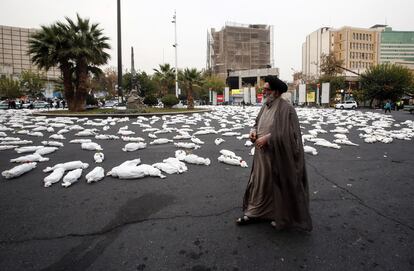A third round of US sanctions against Hamas focuses on the money transfers from Iran to Gaza
The White House has said it has yet to uncover information that Iran was directly involved in the Hamas operation against Israel

The United States on Tuesday said it imposed a third round of sanctions on a group of Hamas officials, members of the Palestinian Islamic Jihad who work to transfer money from Iran to Gaza, and a Lebanese money exchange service that facilitates the transfers.
The Treasury Department sanctions, coordinated with the United Kingdom, come in response to the surprise Oct. 7 attack by Hamas on Israel that left roughly 1,200 people dead or kidnapped. The sanctions block access to U.S. property and bank accounts and prevent the targeted people and companies from doing business with Americans.
This and two previous rounds of sanctions against Hamas and its affiliates are aimed at protecting the international financial system from abuse by Hamas militants and their enablers, the Treasury Department said.
The State Department also is designating a Palestinian Islamic Jihad military leader for diplomatic sanctions. Treasury Secretary Janet Yellen said in an emailed statement that “together with our partners we are decisively moving to degrade Hamas’s financial infrastructure, cut them off from outside funding, and block the new funding channels they seek to finance their heinous acts.”
The White House has said it has yet to uncover information that Iran, the principal financial and military sponsor of Hamas, was directly involved in the multipronged Hamas operation against Israel.
However, the U.S. has conducted three strikes over the last two weeks against Iranian-tied weapons depots in Syria to retaliate for the more than 50 rocket and drone attacks that militant groups have launched since Oct. 7 against U.S. bases in Iraq and Syria, which have caused dozens of minor injuries among U.S. personnel.
President Joe Biden and other officials in his Democratic administration have traveled to the Middle East to show support for Israel and have tried to tamp down tensions in the escalating war between Israel and Hamas. But those efforts have faced massive setbacks.
More than 11,000 Palestinians, two-thirds of them women and children, have been killed since the war began, according to the Health Ministry in Gaza, which does not differentiate between civilian and militant deaths.
The shadowy leader of Hamas’ military wing, Mohammed Deif, said the Oct. 7 assault on Israel was in response to the 16-year blockade of Gaza, Israeli raids inside West Bank cities over the past year, increasing attacks by settlers on Palestinians and the growth of settlements, among other reasons.
Israeli Prime Minister Benjamin Netanyahu, who declared Israel to be at war, said its military would use all of its strength to destroy Hamas’ capabilities. “All the places that Hamas hides in, operates from,” he said, “we will turn them into ruins.”
Sign up for our weekly newsletter to get more English-language news coverage from EL PAÍS USA Edition
Tu suscripción se está usando en otro dispositivo
¿Quieres añadir otro usuario a tu suscripción?
Si continúas leyendo en este dispositivo, no se podrá leer en el otro.
FlechaTu suscripción se está usando en otro dispositivo y solo puedes acceder a EL PAÍS desde un dispositivo a la vez.
Si quieres compartir tu cuenta, cambia tu suscripción a la modalidad Premium, así podrás añadir otro usuario. Cada uno accederá con su propia cuenta de email, lo que os permitirá personalizar vuestra experiencia en EL PAÍS.
¿Tienes una suscripción de empresa? Accede aquí para contratar más cuentas.
En el caso de no saber quién está usando tu cuenta, te recomendamos cambiar tu contraseña aquí.
Si decides continuar compartiendo tu cuenta, este mensaje se mostrará en tu dispositivo y en el de la otra persona que está usando tu cuenta de forma indefinida, afectando a tu experiencia de lectura. Puedes consultar aquí los términos y condiciones de la suscripción digital.








































